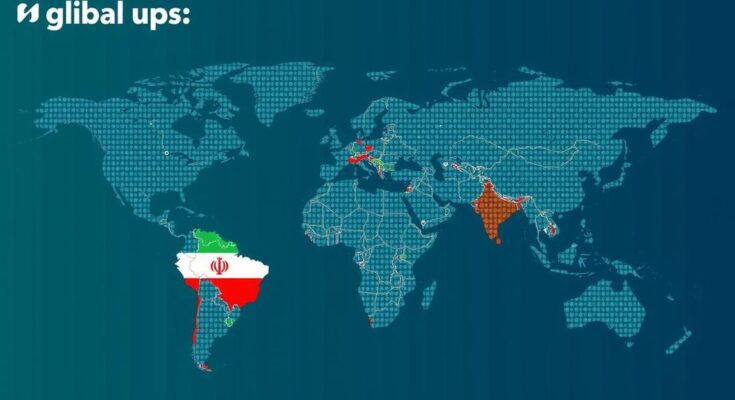The article addresses the humanitarian crisis in Syria due to ongoing violence, the demand for accountability from survivors of the Iranian protests, and preparations for South Sudan’s first democratic elections set for December 2026.
The ongoing conflict in Syria has greatly exacerbated the humanitarian crisis in the region, according to the UN Office for the Coordination of Humanitarian Affairs (OCHA). A recent deadly airstrike at the Ad Dabousiyah border crossing resulted in civilian casualties, including a volunteer from the Syrian Arab Red Crescent (SARC). Injuries to humanitarian vehicles and the destruction of infrastructure have necessitated the suspension of all aid operations at border crossings until further measures can be enforced for the protection of humanitarian workers. Additionally, significant escalation in violence, particularly in Idlib, has led to the tragic deaths and injuries of children, compelling several organizations to halt their activities in the area.
In Iran, survivors of the 2022 “Woman, Life, Freedom” protests have begun demanding accountability for severe human rights abuses that occurred during the government’s violent crackdown. An Independent International Fact-Finding Mission has gathered testimonies from over 50 survivors in Germany, detailing horrific experiences that include torture and arbitrary detention. The Mission’s chair emphasized the necessity of a victim-centered approach in their ongoing investigations, affirming the critical role of these voices in seeking justice.
Finally, amid preparations for South Sudan’s forthcoming democratic elections, the head of the UN Mission in South Sudan (UNMISS), Nicholas Haysom, has urged local governors to promote civic engagement and ensure political freedoms. During a conference in Juba, he highlighted the significance of state leaders in fostering an environment conducive to free participation in the electoral process and the need to deliver essential public services to underpin sustainable governance and peace.
The humanitarian situation in Syria remains critical, worsened by continued military hostilities that endanger civilians and complicate aid delivery. Reports from OCHA indicate that ongoing violence, particularly in regions such as Idlib and western Aleppo, is severely impacting efforts to provide necessary assistance to affected populations, especially children. In Iran, the aftermath of the protests sparked by the tragic death of Jina Mahsa Amini has prompted calls for accountability regarding human rights violations committed during state suppression. Furthermore, South Sudan is gearing up for its first democratic elections in years, necessitating strong political leadership to ensure a fair electoral process and mitigate conflict.
In summary, the article highlights critical humanitarian challenges in Syria amid escalating violence, underscores the fight for accountability among Iranian protesters, and emphasizes the need for civic freedoms as South Sudan prepares for its first democratic elections. Each of these situations reflects broader themes of conflict, human rights, and the power of civic engagement in fostering change. Continuous international attention and support are crucial in addressing these complex issues in each region.
Original Source: news.un.org




